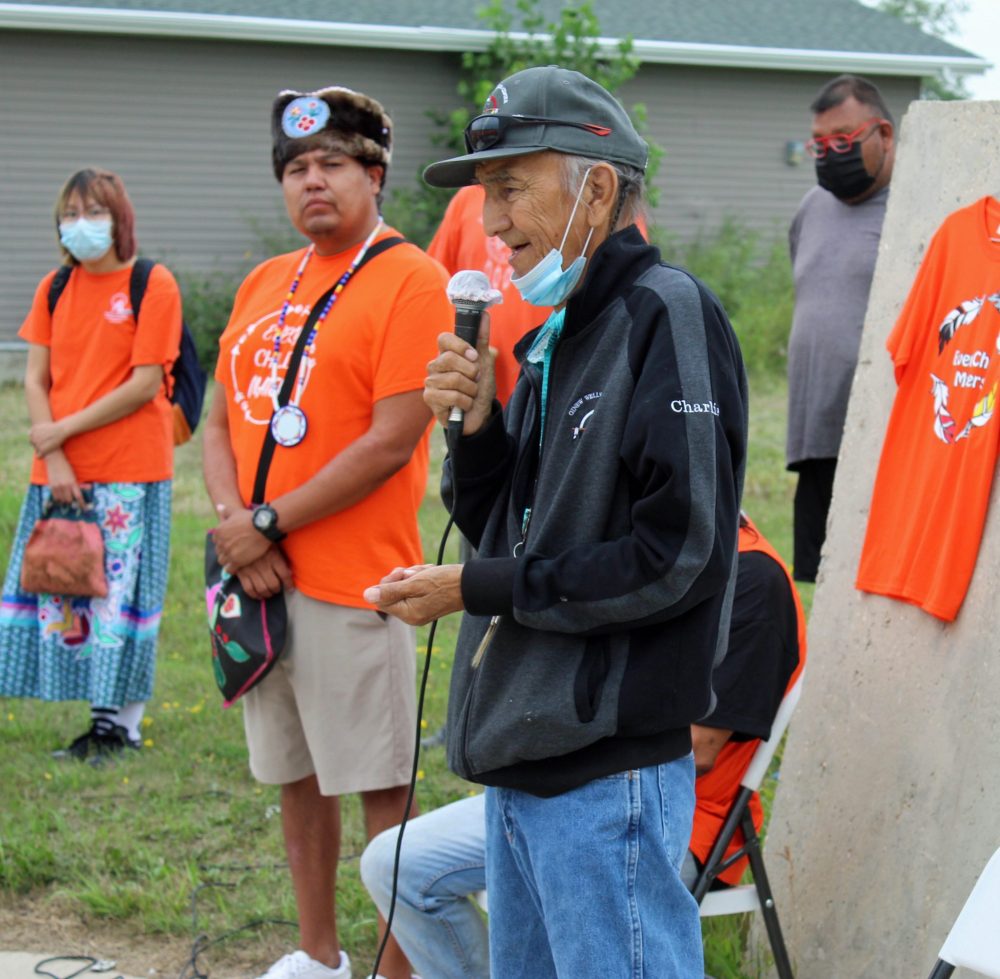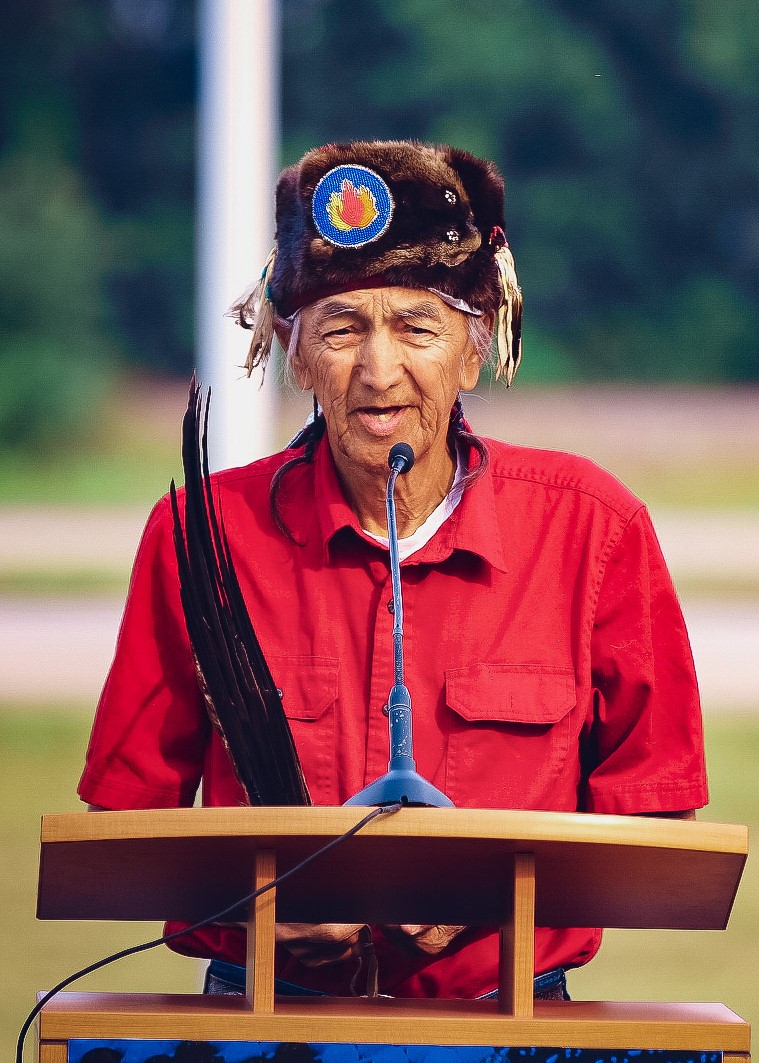‘A living encyclopedia’: First Nation mourns pillar of community
Advertisement
Hey there, time traveller!
This article was published 12/12/2022 (931 days ago), so information in it may no longer be current.
Roseau River Anishinaabe First Nation is mourning the loss of Charlie Nelson, an elder, educator, Pam-Am Games torchbearer, and residential school survivor whose soft-spoken manner and deep well of traditional knowledge took him across Canada and around the globe.
Nelson died of heart failure while undergoing dialysis at Boundary Trails Health Centre on Nov. 26. He was 73.
“He’ll be greatly missed,” Guy Gosselin, executive director of the Ginew Wellness Centre, said this week. “He was my best friend here at Roseau.”

The two men worked together for nearly 25 years. Nelson was part of the committee that hired Gosselin to run the Wellness Centre in 1998. Nelson worked at the Centre two days a week as a traditional healing coordinator, a job he held until his passing.
“He was very respectful, very calm, and very non-judgmental,” Gosselin said. “He was compassionate with everyone.”
“During COVID, he got a team together to go pick medicines and then he blended those into a tea, and we had those available every time we did a vaccination clinic.”
Nelson also established Minweyweywigaan, often called Charlie’s Lodge, a gathering space that hosts workshops, sweat lodges, and other community events.
In recent months, Nelson scheduled his dialysis appointments around the many naming ceremonies and reconciliation events he was asked to attend to deliver prayers and opening remarks.
“He was in very high demand,” Gosselin said. “He was very wise and just kept working right til the end.”
Charles Weston Nelson, also known traditionally as Mizhakwanigiizhik or Nibidekwaneb, was the second of nine children born to Stan and Marjorie Nelson of Roseau River First Nation.
Nelson was educated in Letellier and Emerson. From 1964 to 1969, he attended Assiniboia Residential School in Winnipeg. He later became become an advocate for preserving the Indigenous languages that the architects of Canada’s residential school system sought to exterminate.
As a teenager, Nelson was a member of the FrontRunners, also called Niigaanibatowaad, a group of 10 standout Indigenous track and field athletes who were called upon to carry the torch for the 1967 Pan-Am Games from St Paul, Minn. to Winnipeg Stadium.
Nelson’s oldest child, Zongidaya Nelson, said community members lined Highway 75 to watch Nelson run past Letellier as the group approached the final leg of its 800-kilometre journey.
Upon arriving in Winnipeg, the FrontRunners were sent to a nearby restaurant to watch the opening ceremony on television while a non-Indigenous athlete carried the torch into the packed stadium.
In 1999, when the Pan-Am Games returned to Winnipeg, the FrontRunners carried in the torch and the Manitoba government issued an official apology.
The FrontRunners’ story was recounted in a 47-minute docudrama released by the National Film Board in 2007.
Nelson was elected to Roseau River’s band council in the late 1990s and held the child and family services portfolio.
“I don’t think he ran again,” Gosselin said. “He was more into different kinds of healing rather than the political arena.”
Over the years, Nelson worked for several child welfare authorities. He was a board member and elder for Dakota Ojibway Child and Family Services; a member of the elders’ council of the Southern First Nations Network of Care; and an elder with the Southern Chiefs’ Organization’s Child and Family Services program.
He also joined SCO’s health transformation governance committee and elders and knowledge keepers’ circle.
“He gave so much of his time to the Southern Chiefs’ Organization and the loss of his presence at our tables will be greatly missed,” SCO Grand Chief Jerry Daniels said in a statement to The Carillon.

“Charlie’s teachings helped me, and many other First Nations citizens, learn how to conduct myself in a good way. Every time I ventured to Roseau River, I would look forward to chatting with Charlie and absorbing his wisdom and humour.”
Nelson was also a member of the knowledge keepers’ council of Treaty One Nation Government, a governing body comprised of the seven First Nations which signed Treaty 1 at Lower Fort Garry in 1871. The organization said on Facebook that Nelson was “a man whose smile could light up an entire audience.”
“Charlie was a living encyclopedia of traditional knowledge passed down by our ancestors,” they added. “Each and every one of us who had an opportunity to learn from him have been touched by his gifts and knowledge.”
In recent years, Nelson received many invitations to attend special events and naming ceremonies at schools, universities, museums, and other institutions. The Treaty Relations Commission of Manitoba and the Truth and Reconciliation Commission of Canada also called upon Nelson in his role as a knowledge keeper.
Zongidaya Nelson said he last saw his father at a naming ceremony a week before his death.
“He did a lot of naming ceremonies for people, I think that’s what a lot of people will remember,” Zongidaya said. “For me, it was almost like a flowing river when he was speaking Ojibway.”
Nelson’s children often took turns driving him to events. But Zongidaya said he will most cherish his childhood memories of his father. He recalled playing with his sister in the folds of a teepee his father was assembling.
Nelson was also an adult education instructor, life skills coach, and cross-cultural trainer who mentored local youth and taught them about the treaties.
“We have to keep talking to our kids,” Nelson said at an outdoor ceremony in Roseau River last summer.
“He was a great teacher,” Gosselin said. “He took every opportunity he could to teach and to educate about culture and about health.”
Nelson also represented Anishinaabe culture internationally.
In 1995 and 1998, he was part of an Indigenous Peoples report to the United Nations in Switzerland. He also visited Iraq after an invitation from their ambassador.
In 2003, Nelson took part in Habitat for Humanity builds in Egypt and Jordan.
In 2003 and 2005, he visited Denmark, Sweden, and Norway to talk about his time as a FrontRunner. While there, he took time to visit the Indigenous Sami people of the Nordic region.
